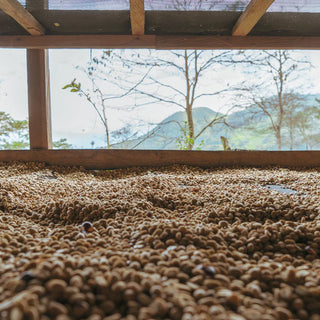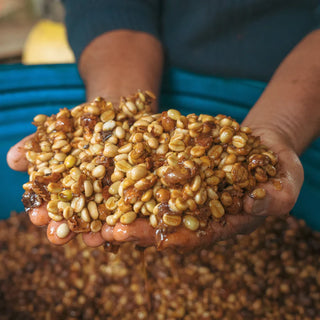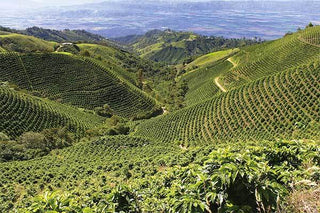


"Sidi Bou" will always be coffee from South America.
South American coffees are generally quite nutty and chocolaty, so if you like this profile, this type of coffee is for you.
We will change the coffee approximately every 3 months, but the general profile will remain the same in all our Sidi Bou coffees.

Bakers Chocolate, Cherry, Plum


"Sidi Bou" will always be coffee from South America.
South American coffees are generally quite nutty and chocolaty, so if you like this profile, this type of coffee is for you.
We will change the coffee approximately every 3 months, but the general profile will remain the same in all our Sidi Bou coffees.

Bakers Chocolate, Cherry, Plum

Farm
'Puente Solaya', or 'Solaya Bridge' in Spanish, signifies the communities from whom this lot is produced. The Solaya hill separates the 17 different producing families, and is a great metaphor of a link, a nexus, a bridge (puente) between these communities that share a great coffee potential and people with great hospitality.
This is the second micro-lot we've received from the Puente Solaya community within 12 months, and for good reason. The bright and vibrant acidity reminds us of Kenyan coffees, while the sweetness is long lasting and full of fruit and chocolate notes.

Processing
Many producing communities throughout Peru have small plots of land, on which they grow and cultivate coffee, other crops and livestock. It is often not viable for small producers to sell their coffees directly to exporters or the international market - instead, small producers from one or more communities often combine their harvests into regional lots, representing a flavour profile reminiscent of their region.
This lot was created by 17 different producers/producing families surrounding the Solaya hill, in the Cajamarca region. Comprised entirely of Caturra and Bourbon varietals, the coffees were fermented for a period of 48 hours before being thoroughly washed, dried and milled for export: The result is a clean, bright and sweet coffee, with soft citrus notes such as clementine,cherry flavoursand sweetness, and a lingering finish of milk chocolate.

Cajamarca, Peru
The northern part of Peru, thanks to the Andes mountain range and its proximity to the equator, has a warm climate, fertile lands and dense vegetation. It is an area with great cultural wealth and full of traditions that the population has managed to preserve up to today. In that northern area, the Cajamarca region stands out for its diversity in geography, ranging from Andean ecosystems to high-altitude forests of great beauty.
Cajamarca’s pastures are well known for providing a great environment for cattle to grow and producing delicious dairy products. It is very easy to fall in love with the gastronomy but also with the quality of the coffee here!



